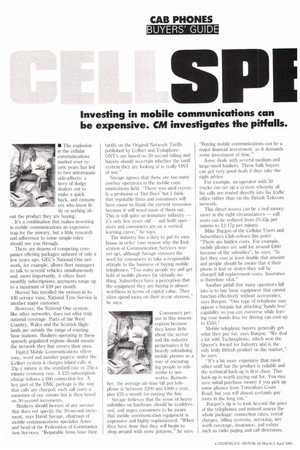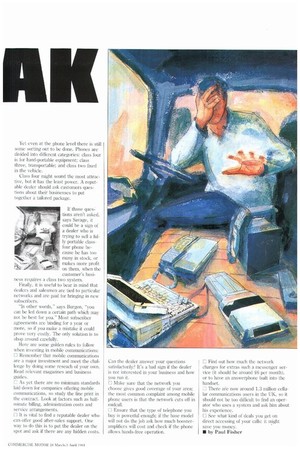• The explosion in the cellular communications market over recent
Page 36

Page 37

If you've noticed an error in this article please click here to report it so we can fix it.
years has led to two unfortunate side-effects: a bevy of dodgy dealers out to make a quick buck, and consumers who know little or nothing about the product they are buying.
It's a combination that makes investing in mobile communications an expensive trap for the unwary, but a little research and adherence to some simple rules should see you through.
There are dozens of competing companies offering packages unheard of only a few years ago. GEC's National One network, for example, allows fleet managers to talk to several vehicles simultaneously and, more importantly, it offers fixed monthly subscriptions; payments range up to a maximum of 239 per month.
Hoover has installed the system in its 430 service vans; National Tyre Service is another major customer.
However, the National One system, like other networks, does not offer truly national coverage. Parts of the West Country, Wales and the Scottish Highlands are outside the range of existing base stations. Hauliers operating in these sparsely populated regions should ensure the network they buy covers their area.
Digital Mobile Communications offers tone, word and number pagers; under the Cellnet system it charges inland calls at 33p a minute at the standard rate or 25p a minute economy rate. A 225 subscription charge follows a 260 connection fee. A key part of the DMC package is the way that calls are charged; each call costs a minimum of one minute but is then based (mi 30-second increments.
Hauliers should beware of any service that does not specify the 30-second increment, says David Savage, chairman of mobile communications specialist Astec and head of the Federation of Communication Services. "Reputable firms base their tariffs on the Original Network Tariffs published by Cellnet and Vodaphone. ONTs are based on 30-second billing and buyers should accertain whether the tariff system they are looking at is really ONT or not."
Savage agrees that there are too many cowboy operators in the mobile communications field. "There was until recently a profusion of *Del Boys' but I think that reputable firms and consumers will have cause to thank the current recession because it will weed most of them out. This is still quite an immature industry — it's only five years old — and both operators and consumers are on a vertical learning curve," he says.
The industry has a duty to put its own house in order (one reason why the Federation of Communication Services was set up), although Savage stresses the need for consumers to take a responsible attitude to the business of buying mobile telephones. "Too many people try and get hold of mobile phones for virtually nothing. Subscribers have a perception that the equipment they are buying is almost worthless in terms of capital value. They often spend more on their in-car stereos," he says.
Consumers persist in this misconception because they know little about the sector and the industry perpetuates it by heavily subsidising 'nubile phones as a way of encouraging people to subscribe to networks. Remember, the average air-time bill per telephone is between 2200 and 2400 a year, plus 225 a month for renting the line.
Savage believes that the issue of heavy subsidies on hardware should be readdressed, and urges consumers to be aware that mobile communication equipment is expensive and highly sophisticated. "When they have done that they will begin to shop around with more purpose," he says. "Buying mobile communications can be a major financial investment, so it demands some investment of time."
Astec deals with several medium and large-sized hauliers. These bulk buyers can get very good deals if they take the right advice.
For example, an operator with 50 trucks can set up a system whereby all his calls are routed directly into his traffic office rather than via the British Telecom network.
This direct access can be a real money saver in the right circumstances — call costs can be reduced from 25-33p per minute to I2-17p per minute.
Mike Burgon of the Cellular Users and Subscribers Club echoes this point: "There are hidden costs. For example, mobile phones are sold for around 2300 because of the subsidies", he says. "In fact they cost at least double that amount and people should be aware that if their phone is lost or stolen they will be charged full replacement costs. Insurance is therefore vital."
Another pitfall that many operators fall into is to buy basic equipment that cannot function effectively without accessories, says Burgon. "One type of telephone may appear a bargain but attaching 'hands free' capability so you can converse while leaving your hands free for driving can cost up to 2550."
Mobile telephone buyers generally get what they pay for, says Burgon. "We deal a lot with Technophone, which won the Queen's Award for Industry and is the only truly British product on the market,"he says.
"It's a bit more expensive than most other stuff but the product is reliable and the technical back-up is first class. That back-up is worth paying out for. You may save initial purchase money if you pick up some phones from Tottenham Court Road, but you will almost certainly pay more in the long run."
Burgon's tip is to look beyond the price of the telephones and instead assess the whole package: connection rates, rental charges, billing systems, servicing, network coverage, insurance, and extras such as radio paging arid call diversions. Yet even at the phone level there is still some sorting out to be done. Phones are divided into different categories: class four is for hand-portable equipment; class three, transportable; and class two fixed in the vehicle.
Class four might sound the most attractive, but it has the least power. A reputable dealer should ask customers questurns about their businesses to put together a tailored package.
If those ques-: tions aren't asked. says Savage, it could be a sign of a dealer who is trying to sell a fully portable classfour phone because he has too many in stock, or makes more profit on them, when the customer's business requires a class two system.
Finally, it is useful to bear in mind that dealers and salesmen are tied to particular networks and are paid for bringing in new subscribers.
In other words," says Burgon, "you can be led down a certain path which may not be best for you." Most subscriber agreements are binding for a year or more, so if you make a mistake it could prove very costly. The only solution is to shop around carefully.
Here are some golden rules to follow when investing in mobile communications: 11 Remember that mobile communications are a major investment and meet the challenge by doing some reseach of your own. Read relevant magazines and business guides.
r. As yet there are no minimum standards laid down for companies offering mobile communications, so study the fine print in the contract. Look at factors such as halfminute billing, administration costs and service arrangements.
El It is vital to fmd a reputable dealer who can offer good after-sales support. One way to do this is to put the dealer on the spot and ask if there are any hidden costs. Can the dealer answer your questions satisfactorily? It's a bad sign if the dealer is not interested in your business and how you run it.
D Make sure that the network you choose gives good coverage of your area; the most common complaint among mobile phone users is that the network cuts off in midcall.
El Ensure that the type of telephone you buy is powerful enough; if the base model will not do the job ask how much boosteramplifiers will cost and check if the phone allows hands-free operation. E Find out how much the network charges for extras such a messenger service (it should be around .!ti per month), or to have an answerphone built into the handset.
Li There afe now around 1.3 million cellular communications users in the UK, so it should not be too difficult to find an operator who uses a system and ask him about his experience.
O See what kind of deals you get on direct accessing of your calls: it might save you money.
• by Paul Fisher
















































































